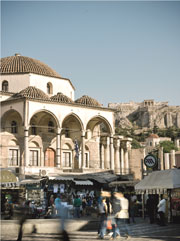As one of the world's oldest cities and the birthplace of democracy, Athens has a lot to live up to and living it up is something this city is famous for. National Geographic Traveller's Nicola Jackson finds that despite the Greek capital's debt problems and infamous radical protests, its most expensive bars, restaurants and shopping districts are still abuzz with Athenians drinking in life - and who can blame them? They invented the right to choose and they choose to burn the candle at both ends.
Every summer Greece's idyllic islands and ancient monuments attract around 16 million tourists in search of hedonism and enlightenment.
Last year was different. In airport lounges, travel agencies and on blogs I witnessed a lot of chatter about the risks of travelling to Greece. The austerity riots frightened people and the strikes had been the final inconvenience that drove tourism away just when the country really needed it. Add to this the ash clouds and the hangover of the recession and Greece was quieter than usual. But in a way, didn't this make travelling to Greece even more attractive? Although it's a bit selfish, I didn't mind the idea of Greece with shorter queues, cheaper tickets, quieter beaches and friendlier service.
I arrived in Athens just two days after the first clash between protesters and police. My hotel, the famous Grande Bretagne, was right on the corner of Constitution Square where the protesters first started getting out of control and forced the Evzoni, who guard the tomb of the unknown soldier, away from their post. From my balcony, I watched as foreign TV crews reported on the breaking news and for a moment I thought I might have just arrived in the eye of a storm.
Downstairs in the hotel's legendary Alexander bar, Athens and its guests were maintaining their composure - impeccable waiters effortlessly ferried drinks and the polite ting of crystal made me feel a bit more at home. With its central location, this elegant hotel has commanded ringside seats for the anti-monarchy demonstrations in 1901 and a military coup in 1909, and served as a political headquarters during both World Wars. The Hotel Grande Bretagne seems to take everything in its stride.
From the bar on the top floor there are views that could inspire you to teach a gripping history lesson. But I wanted to see Athens close up. I ventured out onto the streets, curious to see how real-life Athenians were dealing with recent activities and to explore the sites this city is famous for. I started in the hotel's front yard, Constitution Square, where the Evzoni stand guard in their distinctive clog-and-pompom uniforms, then I cut across the National Gardens to the Panathenaic Stadium, where the world's first Olympic Games were hosted in 1896. Noticing how Athens has the most well-fed stray dogs I have ever seen, I curved back across the park to The Temple of Olympian Zeus then past Hadrian's Arch. I dodged the silent trams and blurring yellow taxis and crossed the street towards the Acropolis. A troubled-looking Greek Orthodox priest crossed my path and in the distance a brass band played, the happy notes hanging in the air as if testing the city's mood. After a short incline through olive trees I caught my first up-close sight of the iconic Parthenon itself. I wasn't the only one. People of every nationality formed a slow pilgrimage up stairs polished smooth as ice by constant footfall. At the top of this unusual rock is the monument to Athena and the astounding view across modern Athens, the distant lavender shades of the Aegean and the smudge of islands.

I was ready to experience the nation's deeply ritualistic café culture. Leaving the Acropolis I strolled downhill towards Thissio and, veering up Akamantos Street, I found Kafeneio Thissio, packed with locals. I'd read that the best Greek coffee is still boiled in hot sand and served in a small copper pot, a briki, that you pour into a thick ceramic espresso-sized cup. The waitress, however, advised me that Greek stomachs these days prefer the ice-cold, black freddo espresso or milky freddo cappuccino. I ordered mine medium for a safe blend of milk and sugar. All over Greece, coffee, whether hot or cold, is served with a glass of water and sipped slowly. A typical visit to a coffee shop for Athenians is around three hours. In contrast, I had already drained my glass and paid my bill while the couple sitting next to me were on sip number four of their drink.
I comfortably spent the next few hours in Monastiraki, where the second-hand bookshops are laden with English classics. I zigzagged through the maze of alleys, rooted through tarnished taps, bric-à-brac and paintings in the antique market square and totally lost track of time. Athenians tend to avoid this area except for Sundays, when it's the only shopping district, known as The Flea Market, that's open.
I poked my head into the popular Kuzina with its white interior and modern take on Greek cuisine but decided to stroll a bit further off the beaten track to the old-fashioned Taverna Platanos. Under dappled light, I devoured its rustic lamb in olive oil and lemon and a glass of tart retsina. As a grey-eyed cat wound its way around my ankles, I remembered exactly why we all fall in love with Greece again and again: it feels like a passage I've read in a book and looks just like the photographs. Greece seldom disappoints its visitors.
As I walked my lunch off along the steep, picturesque back streets and café-lined alleys of Plaka, I suddenly remembered that Athens was supposed to be in turmoil economically and politically. But people were shopping and enjoying the sunshine. Athens seemed unchanged and unaffected until I walked past the bank where three young Athenians had died in a fire set by the rioters. Thousands of bouquets, letters and candles crowded the pavement outside the blackened neoclassical building. People were in tears. It was poignant and sobering. In the tiny church nearby, I watched people solemnly lighting the wicks of fragile candles.

The dining hour in Greece is suitably late. There's enough time after your day to have a well-earned nap and it's cool enough to contemplate eating after the intense summer heat. I took a short taxi ride at 9pm to Alatsi, where the chef, Skarmoutsos, reveals his classicist leanings on his Cretan menu. It was only at 10pm that the restaurant started filling up with guests in search of pure, uncomplicated flavours and ingredients sourced from the chef's birthplace and the 'garden of Greece' - Crete. This chef is bringing back childhood flavours using age-old recipes and traditions that were almost lost to Greek palates - such as rose ice-cream. Is this the taste of authentic Greece? Or is authentic Greece now modern Greece? In the affluent suburb of Maroussi, Aneton is gaining fame and its young chef, Kallidis, is creatively reconstructing Greek flavours. He takes the traditional and reworks it into something contemporary but still deliciously reminiscent of the original. Both restaurants give a new insight into past and present Greece.
The city's inventive, modern personality was instantly visible as I checked into the sleek Hotel Fresh. Lean lines, coloured Perspex and minimal design contrast starkly with the classical, ornate Hotel Grande Bretagne. My room was small but functional and as a result my mood was different. This hotel spills you out into the city early and encourages you to get home later. The graphic roof-top restaurant, pool and bar have a unique urban vantage point, and again gave me an enticing flavour of what the emerging cool generation of Greece has to offer.
Some Greek traditions - like market shopping - will never go out of fashion. I sincerely wished I had worn closed shoes, not flip flops, to The Athens Central Market on nearby Sophocles Street. This vibrant fish, meat and fruit market still buzzes with activity and market sellers entice sales with cheeky banter, fish scales silver the floor and the grandmothers of Athens test and taste fresh produce as their own grandmothers did. There are mountains of olives to sample, plump fruit to squeeze and I bought a bag of the famous pistachios from nearby Aegina island (they deserve their reputation).
Athens is a seaside city but, psychologically, the centre feels miles from any shores. Yearning for seafood and a sea view, I jumped into a taxi to nearby Mikrolimano marina. It's the pretty side of Piraeus harbour and feels completely different to the industrial wharf of monster ferries and hydrofoils. Colourful restaurants cram the quayside and the front tables are so close to the water that children can throw bread crumbs to frenzies of small fish without getting up from their chairs. Nautically inspired Jimmy & The Fish is a gem and was packed with Athenian families sharing multiple courses and energetically passing plates and tastes around the table.
During winter, the nightlife in Athens is intense - everybody is dressed to kill and out past dawn. In summer, the city's best DJs relocate to their favourite islands. And they are not the only ones. You can tell a lot about Greek people's heritage and personality by the island they prefer to spend their summers in. Mykonos is the choice of hedonists, Santorini is for romantics, Hydra lures relaxed creative types and Crete is for foodies. Ikaria is for water-babies, Delos for history buffs and Alonissos is best for quiet contemplators. Each of the 169 islands is unique and by strategic island hopping you can get a good insight into the Greek psyche.
In the spirit of hedonism, the following night I went to Gazi, the area reputed to have eclipsed Psiri when it comes to attracting Athens' in-crowd and I was keen to see why. This former gasworks area has evolved thanks to the redevelopment of the Technopolis into a cultural centre. There's also a cluster of good bars and restaurants. I chose Sardelles, where I sat on the street under lamplight with scents of jasmine lingering in the warm air. Some of the city's trendiest exhibitions, installations and clubs are here, but if it is clubs you're looking for, don't forget the Athens Riviera.
Redeveloped in the run-up to the 2004 Olympics, this area stretches from Glyfyra to Sounion and has been growing in popularity and glamour ever since. Its beach clubs and sleek restaurants have brought a touch of Mykonos cool to the mainland. Partying there has become an Athenian rite of passage.
This party city is a bit like a socialite with a hangover. There's a sense of remorse and a little embarrassment, but no commitment to curbing the lifestyle to which she has become accustomed. The reality is that Greece is troubled but not dangerous and strikes are publicised long before the event. There's plenty of time to amend travel plans en route, and to enjoy having the soft light filtered through gnarled olive trees, the unfurling stone leaves on Corinthian columns, glass-blue water and white-washed walls all to ourselves in 2011.
Athens address book
Hotel Grande Bretagne Constitution Square, 0030 210 333 0000
Kafeneio Thissio 2 Akamantos Street, Thissio, 0030 210 347 3133
Kuzina 9 Adrianou Street, Thissio, 0030 210 324 0133
Taverna Platanos 4 Diogenous Street, Plaka, 0030 210 322 0666
Alatsi 13 Vrasida Street, Hilton area, 0030 210 721 0501
Aneton 19 Stratigou Lekka Street, Maroussi, 0030 210 806 6700
Hotel Fresh 26 Sophocleous Street, 0030 210 524 8511
Jimmy & The Fish 46 Akti Koumoundourou Street, Mikrolimano, Piraeus, 0030 210 412 4417
Sardelles 15 Persefonis Street, Gazi, 0030 210 347 8050
Getting there: Best price The best prices and most convenient flight times (be sure to check the flying times of both legs as one is often longer) from Johannesburg to Athens are currently with Egypt Air from R5 213 return or with Turkish Airlines and Qatar from R5 831 to R6 089 return if you can be flexible with dates. www.kayak.com.
Photographs David Crookes































 Published in arrangement with National Geographic Traveller, South Africa -
Published in arrangement with National Geographic Traveller, South Africa -